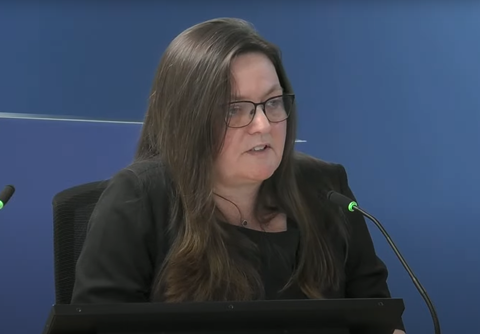Sarah Colwell ignored industry group’s attempts to chase the matter for 16 months
A Building Research Establishment (BRE) expert failed to clarify confusing building regulations which appeared to permit the use of combustible cladding on tall buildings because she believed the guidance would be revised, the Grenfell Inquiry has heard.
An ambiguous passage in Approved Document B, the part of building regulations which deals with fire safety, said that only ‘filler’ materials in cladding systems were required to meet the standard of ‘limited combustibility’.
There was a widespread belief in the construction industry that the word ‘filler’ applied only to materials used to fill gaps between insulation and not cladding panels themselves, leading to what inquiry to the counsel Richard Millett QC has described as a “10-year legacy of misunderstanding”.
The inquiry has already heard that the BRE’s Sarah Colwell had agreed to draft an FAQ clarifying the confusion following a meeting in July 2014 with senior civil servant Brian Martin and industry group the Centre for Window and Cladding Technology (CWCT).

But the FAQ was never added to the guidance and the inquiry heard last week that Colwell did not respond to several emails, phone calls and voicemails over the next 16 months from the CWCT chasing the matter.
Colwell told Wednesday’s hearing that she did not complete the FAQ and did not discuss it further with Martin following the 2014 meeting because “it was assumed” that the existing guidance would be revised, admitting that “with hindsight, [it was] something I should have done”.
She added that she had started writing the FAQ but then realised by September that year that it was a “more complex piece of activity than just a single set of lines”.
Asked by counsel inquiry Kate Grange QC if BRE staff had thought this meant that a further discussion with Martin might be required, Colwell said: “We were aware that Brian would have been in receipt of 11 the minutes and we were aware that Brian was aware that there was a need for this work to be undertaken, so we didn’t pursue it again.”
But she also admitted that she regretted not keeping the CWCT up to date with the BRE’s thinking, telling Grange: “I fully acknowledge that that was a lapse on my part of not keeping them informed of that thought process.”
It was pointed out that this disclosure was not included in Colwell’s witness statement.
Last week the inquiry heard that Martin had told a group of cladding experts at the 2014 meeting that “there is going to be a major fire” because of the confusing passage in the regulations.
Asked by Millett if this clarification had been “desperately needed by the industry”, CWCT director Metcalfe replied: “Yes.”
The inquiry continues.


























No comments yet